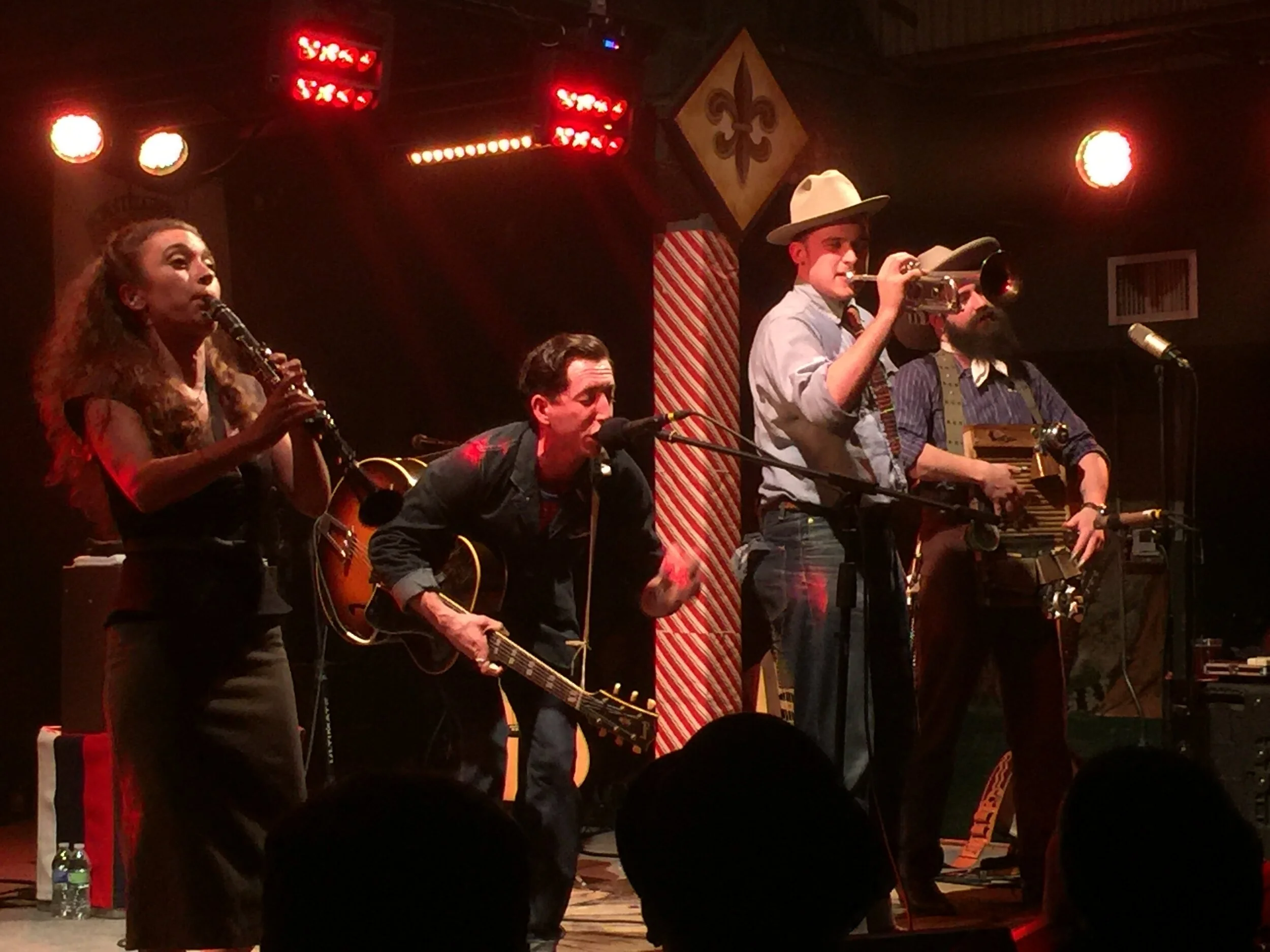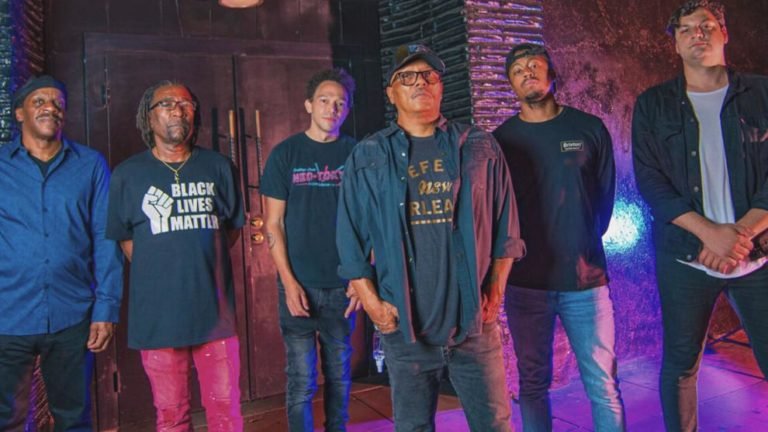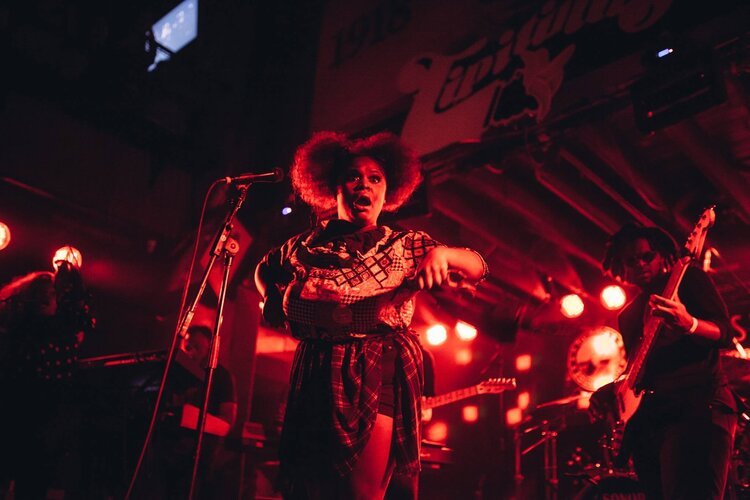Put Venue Reopening in the Hands of the Music Community

Pokey LaFarge onstage at Tipitina’s in 2015, by Alex Rawls
It’s time for a new approach to reopening New Orleans’ music venues.
Recently, we wrote that Gasa Gasa is now for sale, and members of Galactic have made clear that Tipitina’s can’t last much longer without some kind of change. The band will kick off season one of Tipitinas.TV—a series of live-streams from the Uptown music club—on Saturday at 9 p.m., but it’s hard to see that project as the answer.
Recently, musicians and venues took to social media to try to rally support for the passage of the RESTART Act, which would help small businesses and independent venues survive this forced down time. Unfortunately, concerns about deficit spending and doubts about the need for additional financial help kept Republicans in the Senate and White House from coming together to support any economic response to the current situation other than toughing it out, and I’m not optimistic that they’ll change their stance for the RESTART Act and the Save Our Stages Act—despite the latter’s bipartisan support from Senators John Cornyn of Texas and Amy Klobuchar of Minnesota—with fewer than 90 days to the election.
Right now, New Orleans’ musicians and music fans are waiting for City Hall to say that live music venues can reopen. Because most of the city’s musicians rely on gig money to pay the bills, that leaves a lot of people understandably desperate and impatient. The current dynamic inevitably feels a bit parental, even if it’s sensible and necessary to help New Orleans stop the spread of COVID-19. But while we’re still in Phase 2, it’s time for City Hall to consider a new approach to the problem of reopening the clubs.
The current approach appears to be to wait until the city and state have drastically reduced the number of Coronavirus infections. That’s understandable, but perhaps there’s a better way to approach the problem of reducing the probability of future infections. I’d like to see City Hall lay out a set of goals that venues have to meet in order to open, then challenge them to figure out ways to reach those goals. If they can do so once we’re out of Phase 2, then they can open. The current model inevitably comes with a parental undercurrent that musicians and fans naturally resist, particularly if their livelihood relies on those venues. But if the city laid out the criteria and allowed venues to open if they have clear, concrete plans to successfully meet them, venue owners and musicians would be empowered to take control of their situations and think creatively about possible ways to solve the problems that stand in their way.
City Hall would have to do some research, but a lot of that work has already been done by sports franchises and other businesses that are in the crowd management business. Many have done studies and/or consulted with lawyers and public health officials about how to questions that come quickly to mind, like how people watch the show, to ones that are less likely, like how they safely use the bathroom. Many clubs wedged bathrooms into some of the smallest and tightest spaces, which means that social distancing will be a challenge under almost any situation. Some proposals that I’ve seen call for a lot of manpower, something that will be hard to afford with the income that comes from socially distanced audiences, but perhaps people can think of other possibilities.
This would require some research on the part of the city to establish the goals, but a lot of preliminary work along these lines has already been done. Sports franchises have had to explore ways to make their events as safe as possible, and the problems they had to solve are similar to ones that clubs face. There have also been documents outlining steps venues need to take to reopen, so in some cases, venues will simply need to think about to implement those plans. In other instances though, venues will have to think creatively and some may have to acknowledge that they simply can’t reopen until the science surrounding Coronavirus has advanced.
If the city challenges venues to work out solutions, it will implicitly invite the music community in New Orleans and around the country to share ideas for possible solutions. I’ve wondered if having chairs in taped boxes in pairs on the floor of venues and requiring guests to stay with theirs might help drinkers remember to socially distance, even after drinks make it harder for guests to accurately estimate six feet. Earlier shows will give patrons less time to get loaded, which will also help stave off impaired misjudgments of distances. That would hurt a venue’s take at the bar, but it would make it more likely that live music venues don’t become sites for Coronavirus transmission. Others likely have similar ideas that might make it easier for venues to open without becoming sites for transmission, and now is the time to get those ideas in circulation.
This proposal doesn’t address the economic viability of venues, and many businesses in the hospitality industry have said that they can’t scale down and stay in business. There’s no question that some venues won’t be able to afford to open under any conditions other than a return to pre-pandemic times, but the larger economic questions can’t be solved until the health issues are solved. This idea is a way to start getting musicians and those in the music industry back to work. It won’t help everybody, and venues reliant on touring acts will likely be down until at least summer 2021. Some of New Orleans’ most intimate venues will also suffer, but some will be able to open with some creativity. Socially distanced shows are no substitute for the communal excitement of a concert, but until we’re better able to treat and stop the transmission of COVID-19, it’s the best option for those of us not prepared to ask people to risk their lives for rock ’n’ roll.
The time to start this process is now. Orleans Parish’s numbers are trending down, and people are well past ready to see live music. If City Hall does so, it can change its relationship to the music community that in large part gives New Orleans its identity. It can maintain the current oppositional posture, standing between musicians, their audiences, and earning a living; or it can become partners by laying out the public health goals and encouraging everybody interested to help the venues find ways to meet them. It may not always seem like the Mayor’s office wants the clubs to reopen, but the mayor knows as well as anybody thatNew Orleans has made itself a tourism town. The wisdom of that can be debated, but the centrality of live music to that economy can’t. It is essential to the city’s appeal to tourists, and the economy won’t recover until we once again have music in the clubs. We all need to do the work to make that happen.
Want a starting place? Here’s the Oregon Health Authority’s guidance for opening the state’s venues, and the Event Safety Alliance has the go-to guidelines that many organizations use. Reopen Every Venue Safely has also posted a Best Practices Guide.
Creator of My Spilt Milk and its spin-off Christmas music website and podcast, TwelveSongsOfChristmas.com.






